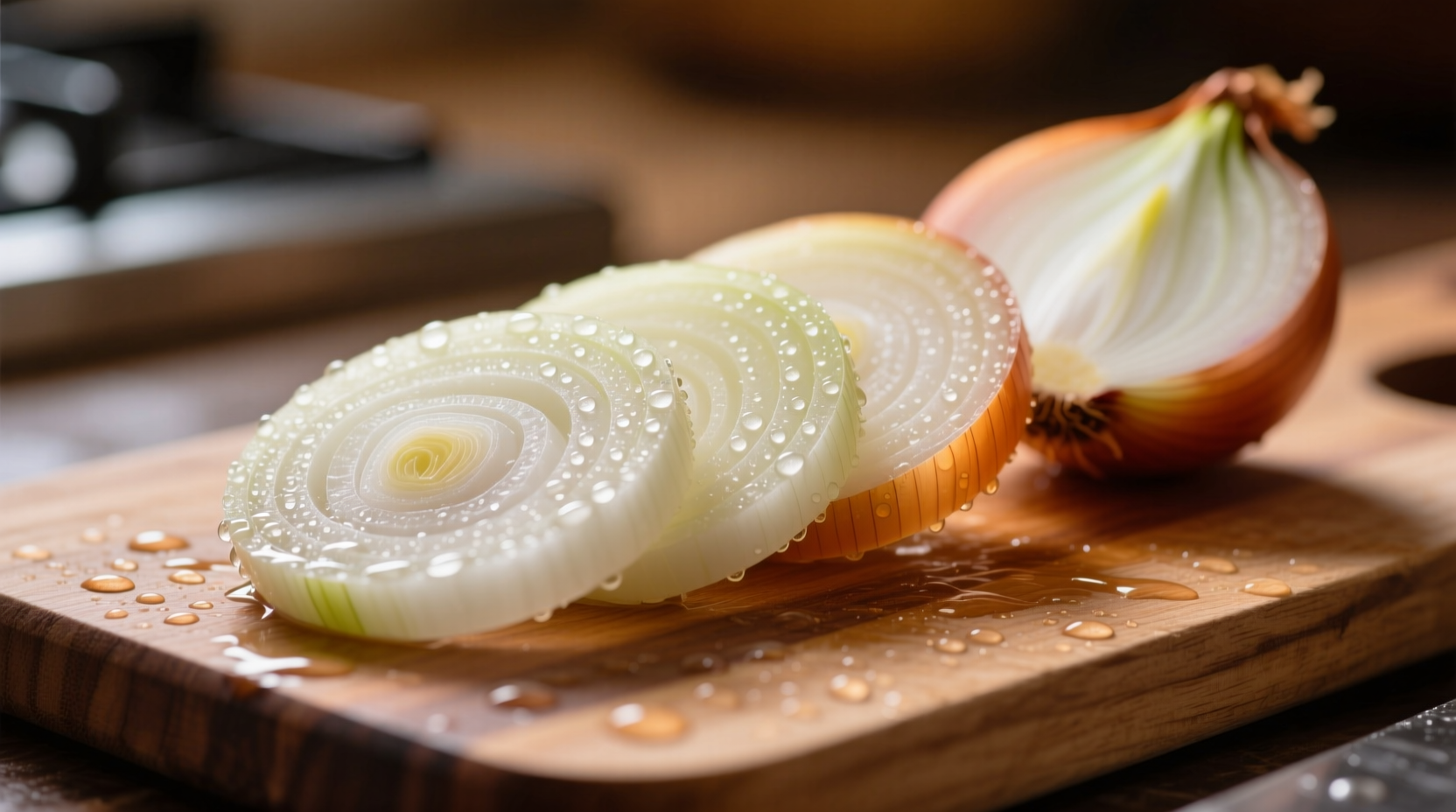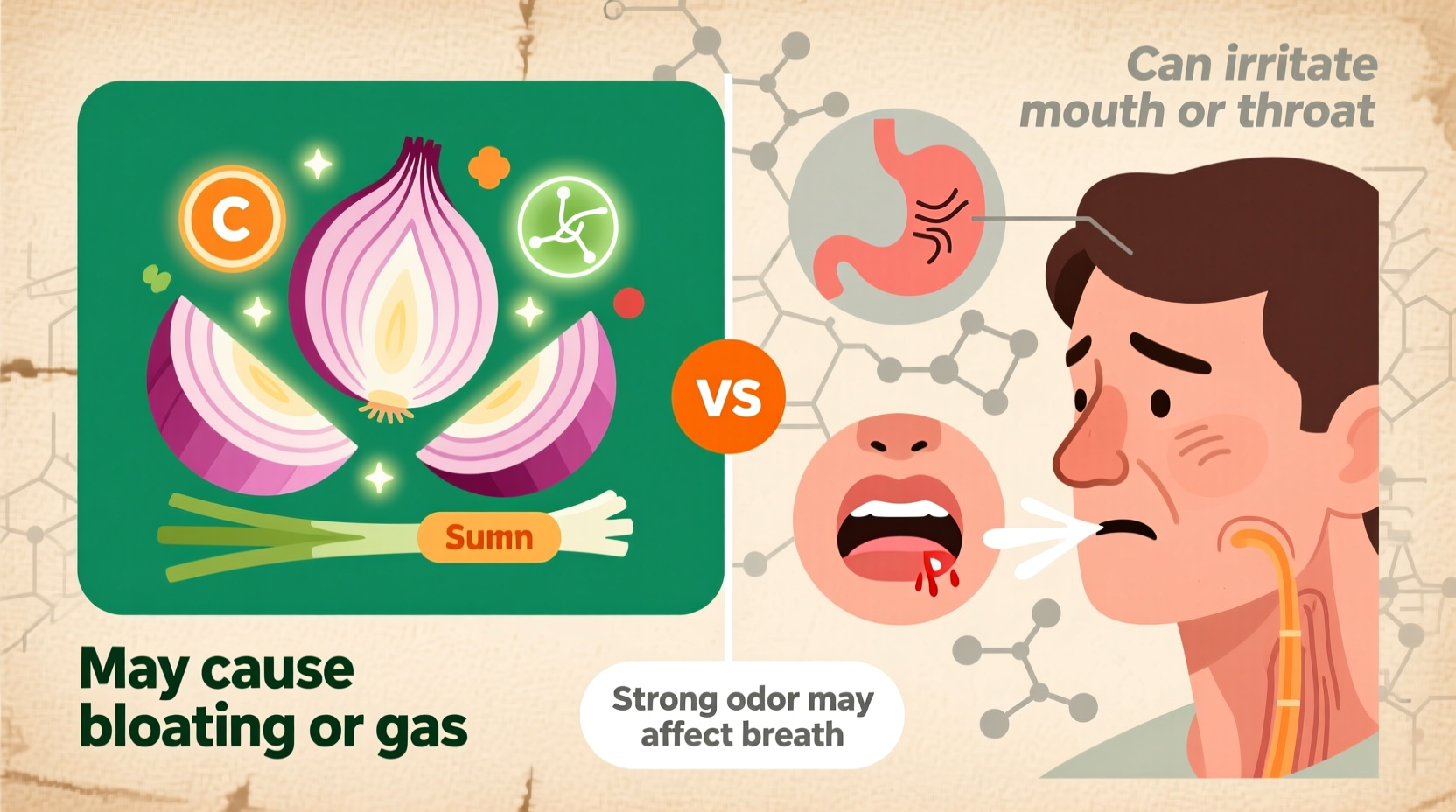Eating raw onions adds flavor and nutrition to meals, but they come with several potential drawbacks that affect many consumers. Understanding these disadvantages helps you make informed dietary choices while still enjoying this versatile vegetable.
Common Digestive Discomforts from Raw Onions
Raw onions contain high levels of fructans, a type of FODMAP (fermentable oligosaccharides, disaccharides, monosaccharides, and polyols) that many people struggle to digest properly. When these compounds reach your large intestine, gut bacteria ferment them, producing gas that leads to uncomfortable symptoms.
| Digestive Symptom | Frequency Among Sensitive Individuals | Typical Onset Time |
|---|---|---|
| Bloating and abdominal distension | 78% | 30-90 minutes |
| Excessive gas production | 65% | 1-2 hours |
| Abdominal cramping | 52% | 45-120 minutes |
| Diarrhea (in IBS sufferers) | 41% | 2-4 hours |
This data from the American College of Gastroenterology demonstrates why raw onions frequently appear on elimination diets for people with irritable bowel syndrome (IBS). The Monash University Low FODMAP Diet research confirms that even moderate portions (¼ cup or more) can trigger symptoms in sensitive individuals.
Social and Oral Health Considerations
One of the most noticeable disadvantages of consuming raw onions is persistent bad breath, scientifically known as halitosis. Unlike cooked onions, raw varieties contain higher concentrations of volatile sulfur compounds that enter your bloodstream and are expelled through your lungs.

These compounds create that distinctive onion breath that can linger for up to 24 hours after consumption. Additionally, raw onions' acidity can temporarily weaken tooth enamel, potentially contributing to dental erosion when consumed frequently.
Heartburn and Acid Reflux Triggers
Raw onions relax the lower esophageal sphincter (LES), the valve that prevents stomach acid from flowing back into the esophagus. According to research published in the World Journal of Gastroenterology, raw onion consumption increases the frequency of acid reflux episodes by 50% compared to not consuming onions.
This effect is particularly problematic for people with gastroesophageal reflux disease (GERD), where even small amounts of raw onion can trigger uncomfortable symptoms. The study noted that cooked onions produced significantly fewer reflux episodes, suggesting preparation method matters for those with sensitive digestive systems.
Understanding Onion Sensitivity vs. Allergy
While true onion allergies are rare (affecting less than 1% of the population according to American Academy of Allergy, Asthma & Immunology), many people experience onion intolerance. The key differences:
- Intolerance: Digestive symptoms only (bloating, gas, cramps), dose-dependent, develops gradually
- Allergy: Immune response causing hives, swelling, breathing difficulties, can be life-threatening, occurs quickly after exposure
If you experience symptoms beyond digestive discomfort—such as itching, swelling, or difficulty breathing after consuming onions—consult an allergist immediately.
When Raw Onions May Worsen Existing Conditions
Certain health conditions can be exacerbated by raw onion consumption:
- IBS and IBD: High FODMAP content triggers symptom flares
- GERD: Relaxes esophageal sphincter, increasing acid reflux
- Ulcers: May irritate stomach lining due to acidity
- Blood thinning conditions: Contains compounds that may enhance blood-thinning medication effects
People taking anticoagulant medications should discuss onion consumption with their healthcare provider, as the quercetin and sulfur compounds in onions may interact with blood-thinning medications.
Practical Solutions for Enjoying Onions Without Discomfort
You don't need to eliminate onions completely—these strategies can help reduce negative effects:
- Try cooking methods: Sautéing, roasting, or grilling breaks down fructans, making onions easier to digest
- Reduce portion size: Limit raw onion to 2-3 tablespoons per serving
- Rinse sliced onions: Soaking in cold water for 10 minutes reduces sulfur compounds
- Choose milder varieties: Sweet onions like Vidalia contain fewer irritating compounds
- Pair with digestive aids: Consume with probiotic-rich foods like yogurt
When to Consult a Healthcare Professional
While occasional digestive discomfort from raw onions is common, seek medical advice if you experience:
- Severe abdominal pain after consuming small amounts
- Blood in stool or vomit
- Symptoms that persist for more than 24 hours
- Unintentional weight loss alongside digestive issues
- Difficulty swallowing or breathing after consumption
These could indicate more serious conditions requiring professional evaluation beyond simple food sensitivity.
Finding Your Personal Tolerance Level
Individual tolerance to raw onions varies significantly. Consider keeping a food diary to track:
- Portion sizes consumed
- Preparation methods (raw, cooked, pickled)
- Timing of symptoms
- Other foods consumed simultaneously
This information helps identify your personal threshold and whether specific onion varieties affect you differently. Many people discover they can tolerate small amounts of raw onion when consumed as part of a balanced meal rather than on their own.
Conclusion: Balancing Benefits and Drawbacks
While raw onions offer valuable nutrients like vitamin C, antioxidants, and prebiotic fiber, their potential disadvantages shouldn't be ignored. By understanding your personal tolerance and implementing practical strategies, you can enjoy onions' benefits while minimizing discomfort. Remember that cooking significantly reduces most negative effects while preserving many nutritional benefits—making onions a versatile ingredient for nearly every dietary need.











 浙公网安备
33010002000092号
浙公网安备
33010002000092号 浙B2-20120091-4
浙B2-20120091-4